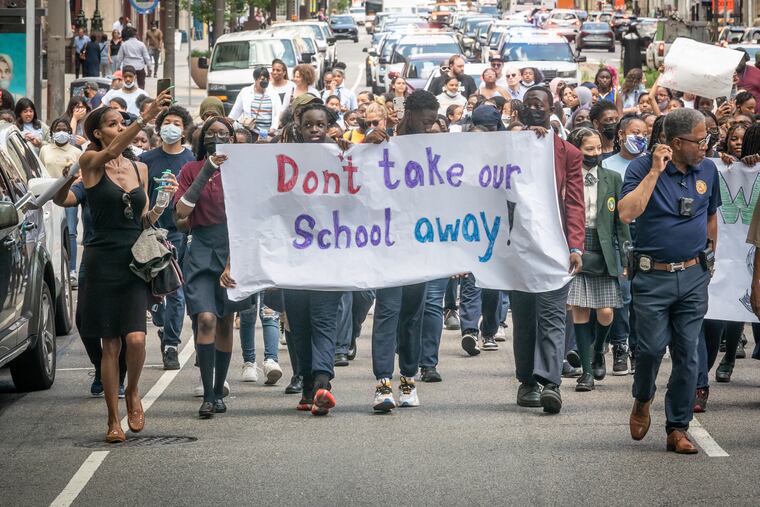Charter school advocates protested Philly’s move to close two Black-led charters
Most of the district charter schools closed or recommended for closure between 2010 and 2020 have had Black leaders, even though Black-run schools make up a minority of Philadelphia’s 85 charters.

Charter school leaders, students and parents, and elected officials on Thursday protested a move by the Philadelphia Board of Education to end charter agreements with two Black-founded and -led schools — arguing that the district shouldn’t be closing schools during an investigation into whether it acted with racial bias toward other charters.
At a news conference outside district headquarters on North Broad Street that drew about 150 people who later marched to City Hall, members of the city’s African American Charter School Coalition and other charter advocates accused the district of continuing to employ what they call an unfair evaluation process, resulting in a disproportionate closure of schools with Black leaders.
The latest complaint follows a presentation from the district’s Charter School Office last month concluding that three charter schools did not meet standards. The school board indicated it would consider ending agreements with those schools, which include two — Laboratory Charter School, with campuses in North Philadelphia and East Falls, and Southwest Leadership Academy Charter School in Southwest Philadelphia — with Black leaders.
Most of the district charter schools closed or recommended for closure between 2010 and 2020 have had Black leaders, according to the African American charter coalition, even though Black-run schools make up a minority of Philadelphia’s 85 charters. Charter schools are publicly funded but independently run.
“What they have done is double-down on a biased policy,” Larry Jones, CEO of Richard Allen Preparatory Charter School in Southwest Philadelphia, said while flanked by students holding posters reading “Our Voices Matter” and “Leave our School Alone.”
Others said the school board or district officials told them there wouldn’t be non-renewals of charter schools while the discrimination claims were being investigated.
“Someone lied to me,” City Councilmember Isaiah Thomas said, joining the protesters outside City Hall. Thomas called the racial imbalance in the leadership of closed charters “discriminatory.”
The school board announced late last year that it had tapped the law firm Ballard Spahr to lead an investigation into the allegations, as well as another firm with expertise in racial equity analyses.
With that investigation ongoing — the board previously said it expected results to be released this fall — Jones questioned how the district could move forward with charter evaluations.
A school district spokesperson declined to comment Thursday, calling charter renewals a board decision. A spokesperson for the school board also declined to comment.
As in other Pennsylvania school districts, the board is charged with authorizing charter schools. In Philadelphia, charters enroll about 70,000 students, or one-third of the district’s total. Schools are typically granted charter agreements to operate for five years, at which point the board decides whether to renew them.
» READ MORE: Black leaders ask: Is the Philadelphia School District ‘targeting’ minority-led charters?
In Philadelphia, that follows an evaluation by the school district. During a May school board meeting, the director of the district’s Charter School Office discussed its evaluations for schools up for renewal this year, based on a rubric considering academic success, organizational compliance, and fiscal health. The office recommended renewals for five schools. For another eight, it advised renewals with conditions.
But it didn’t make a recommendation for Laboratory Charter, Southwest Leadership Academy, or Memphis Street Academy Charter School in Port Richmond. All received a “does not meet standards” rating from the office in at least one area — academics, organization, or finance. Southwest Leadership Academy was found deficient in all three.
Peng Chao, director of the district’s Charter School Office, told board members during the meeting that it’s rare for a school to get that rating in every category. As for the issues identified by the charter office, “we haven’t had much of a response from the school,” Chao said.
During the meeting, the school’s board president, Joyce Wilkerson, told district officials to prepare non-renewal notices for Southwest Leadership Academy and Laboratory Charter for the board to consider at its June 23 meeting. She also said the board would consider ending the charter agreement with Memphis Street Academy.
Hanif Moore, president of the Southwest Leadership Academy board, said during Thursday’s news conference that the district’s evaluation was “bogus,” though he did not cite specific areas of dispute.
Laboratory Charter was rated as “approaching” standards in academics and financial health, but not meeting the bar for organizational compliance. School leader Jae Strothers told the crowd Thursday that she believed she had faced bias as an openly transgender woman.
The district “consequently questioned my role” and actions, Strothers said, “rather than getting support from the Charter School Office over the past year.” (District spokesperson Monica Lewis said that while the office monitors the performance of charter schools, it “does not get involved with personnel matters.”)
One of the city’s longest running charters, Laboratory has seen enrollment decline. Authorized to enroll 1,075 students, it started the school year with 686, which fell to 531 by May, according to the district.
Strothers said Thursday that busing problems were to blame for the enrollment drop, and faulted the district, which handles charter busing.
As they argued for schools to remain open, charter advocates said the district wasn’t valuing the role of their schools, or the choices of families that had sought to enroll in them.
Referring to the district headquarters behind him, and the arrival of new superintendent Tony Watlington, State Sen. Anthony Williams told the children gathered: “The folks inside that building are telling him that you don’t matter. They’re telling him that charters are the problem. They’re telling him that you are the problem.”
“Are you the problem?” he shouted. “No!” the kids responded. Williams said: “That makes them the problem.”